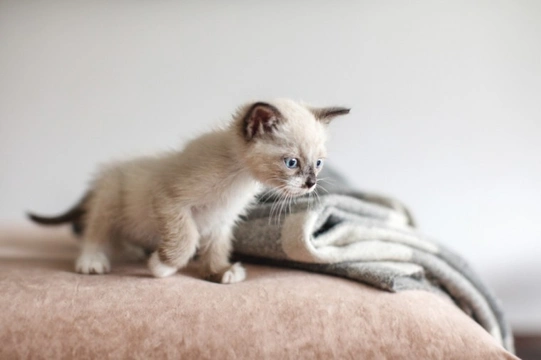
How would you know if your cat was stressed?
Cats are sensitive creatures that like to have their own territory with familiar things, and to understand the parameters of what to expect from their home, owner, and wider world. They also like a fairly quiet life and for things around them to be settled and peaceful, and even bringing a new item of furniture into your cat’s home or washing their favourite blanket will often be met with a high level of suspicion and protracted period of investigation on the part of your cat before they give it their seal of approval!
This means that happiness for a cat is something of a delicate balance, which is partially dependent on a lot of things outside of their control, and in the hands of their owners; and there are a lot of things that cat owners do that inadvertently stress their cats out, which we’ll look at in more detail in another article.
The idea that your cat might be stressed is of course an unpalatable one for cat owners, and something we’d all take pains to address if we suspected it; but before you can get to the bottom of what is stressing your cat out, you first need to know how to identify that your cat is stressed in the first place.
This isn’t always obvious; cats are very good at masking their feelings in order to avoid being vulnerable, and this makes the signs of stress in cats easy to miss, as they can be subtle and complex.
With this in mind, this article will tell you some of the most common indications that your cat is stressed. Read on to learn more.
They keep disappearing off or you suspect they’re visiting a neighbour
Some cats visit lots of homes in their local area and successfully beg a meal from each, and this isn’t necessarily a sign of stress; but if your cat hasn’t always been a bit of a “six dinner Sid” in this respect and they suddenly start disappearing or spending more time with someone else, something in your own home might be unsettling them or stressing them out.
They toilet inappropriately in the house
If your cat suddenly starts toileting in the house, spraying, or going to the toilet away from the litter tray/outside, you should get them checked out by the vet in case there’s a physical cause for this. The same is true for many of the potential signs of stress in cats, including the behavioural ones.
However, inappropriate toileting is also a common sign of stress in cats.
They are destructive
Some cats claw the furniture and carpet and are generally fairly destructive, and this is not always a sign or stress. However, if this is a new behaviour in an adult cat, consider stress as a cause.
They suffer from recurrent health issues like cystitis or unexplained skin conditions
Some physical health issues develop due to stress in cats, like cystitis, irritable bowel syndrome, and some types of skin conditions. Physical problems like these once more require a trip to the vet, but they may ultimately have their roots in stress.
They groom themselves excessively, potentially even pulling their fur out
Cats are fastidious about their grooming and spend a lot of time doing it, but if your cat grooms to excess, particularly if they end up with bald patches or deliberately pull out their fur, this is not normal.
A skin condition, stress, or both might be the cause, and once more, it mean a trip to the vet for assessment.
They hide and don’t want to interact with you
If your previously friendly cat avoids you, hides, is reluctant to be out in the open in the home and seems unnerved about eating or using the litter tray, they might be stressed or even frightened of something.
They become excessively clingy and demanding
On the flipside, if your cat becomes very clingy, follows you around, needs continual attention and meows at you a lot and this isn’t their normal behaviour, the chances are they are stressed and unsettled.
They go off their food
If your cat seems reluctant to eat foods they used to like or they avoid coming out to eat or eat in a hurry and get away again, this might be due to stress. This is particularly likely if they’re being bullied by another cat.
They lash out or become aggressive
A cat that suddenly becomes aggressive or unpredictable and apt to lash out may have a physical health issue or be suffering from stress.
They begin to look unkempt
Stress is bad for your cat’s emotional and also physical health, and over time this will begin to manifest in their appearance. If they start to look unkempt, stop grooming themselves, or have a dull or matted coat, this might be stress-related.



